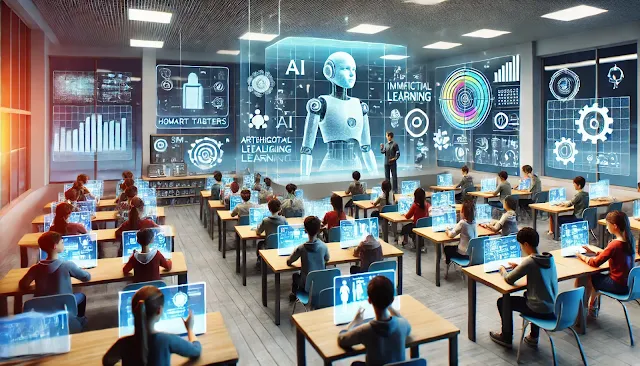Artificial Intelligence (AI) is revolutionizing various sectors, and education is no exception. With advancements in AI-driven tools, personalized learning experiences, and automation of administrative tasks, the educational landscape is evolving at an unprecedented pace. AI in education is not just about automating tasks; it is about creating adaptive learning environments that cater to the unique needs of students. This article explores how AI is transforming education, the benefits and challenges it presents, and what the future holds.
The Role of AI in Modern Education
AI is integrated into education in multiple ways, from intelligent tutoring systems to automated grading. The primary roles of AI in education include:
- Personalized Learning: AI algorithms analyze student performance and learning habits to tailor content that suits their needs. Platforms like Coursera, Khan Academy, and Duolingo use AI to provide customized learning paths.
- Automated Assessment and Feedback: AI-driven grading systems can evaluate essays, multiple-choice questions, and even subjective answers, providing instant feedback to students and reducing the workload for educators.
- Smart Content Creation: AI can generate educational content, summarize textbooks, and even create interactive exercises that enhance student engagement.
- Virtual Assistants and Chatbots: AI-powered chatbots assist students in answering queries, providing study resources, and offering academic guidance.
- AI-Powered Proctoring: Online examination systems use AI to detect cheating and monitor students during exams, ensuring academic integrity.
- Enhanced Accessibility: AI tools provide learning opportunities for students with disabilities, such as speech-to-text tools and AI-generated subtitles for videos.
Benefits of AI in Education
The integration of AI in education comes with several advantages:
- Improved Learning Outcomes: AI-powered platforms analyze student progress and adapt teaching methods accordingly, leading to better comprehension and retention.
- Efficient Administrative Processes: AI automates administrative tasks like student enrollment, attendance tracking, and grading, allowing educators to focus on teaching.
- Scalability: AI enables education to reach a broader audience, breaking geographical barriers through online learning platforms.
- Lifelong Learning: AI facilitates continuous learning by offering courses that cater to different career paths and skills.
- Engagement and Interactivity: AI-driven gamification and interactive simulations make learning more engaging and enjoyable.
Challenges of AI Integration in Education
Despite its benefits, AI in education faces several challenges:
- High Implementation Costs: Developing and maintaining AI-based systems require significant investment in infrastructure and software.
- Data Privacy Concerns: AI relies on collecting and analyzing student data, raising concerns about data security and privacy.
- Teacher Training: Educators need proper training to effectively use AI tools in their teaching methods.
- Dependence on Technology: Excessive reliance on AI can lead to reduced critical thinking and problem-solving skills among students.
- Bias in AI Algorithms: AI models can sometimes reflect biases in the data they are trained on, leading to unfair assessment and recommendations.
Future of AI in Education
The future of AI in education looks promising, with innovations such as:
- AI-Powered Learning Companions: Virtual tutors that provide real-time assistance and adaptive learning experiences.
- Augmented Reality (AR) and Virtual Reality (VR): AI-driven immersive learning experiences using AR/VR to enhance practical understanding.
- Blockchain for Education: AI combined with blockchain technology can ensure secure and transparent academic records.
- Emotional AI: Systems that can analyze student emotions and adjust teaching strategies accordingly to improve engagement.
- AI in Career Guidance: AI-based platforms that help students choose career paths based on their strengths and interests.
Conclusion
AI is transforming education by making learning more personalized, accessible, and efficient. While challenges exist, continuous advancements in AI technology will drive the future of education, making it more inclusive and innovative. The key to successful AI adoption in education lies in balancing technology with human interaction, ensuring that learning remains engaging and meaningful.

















0 Comments